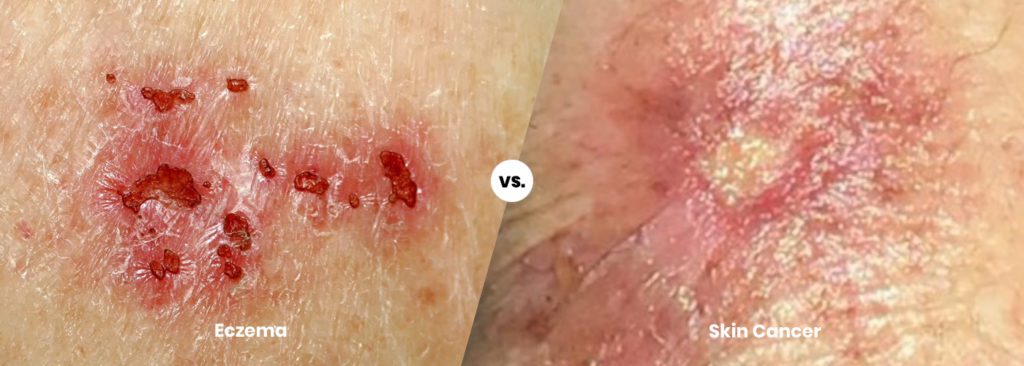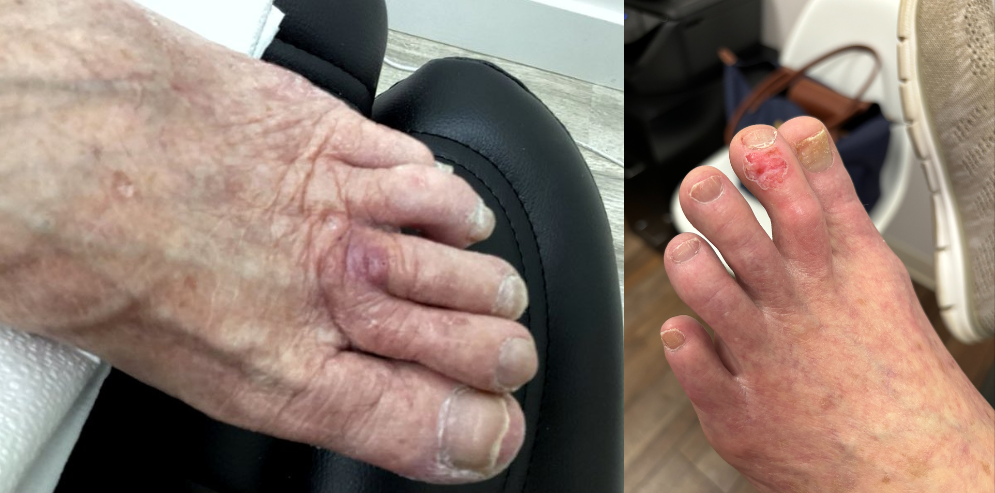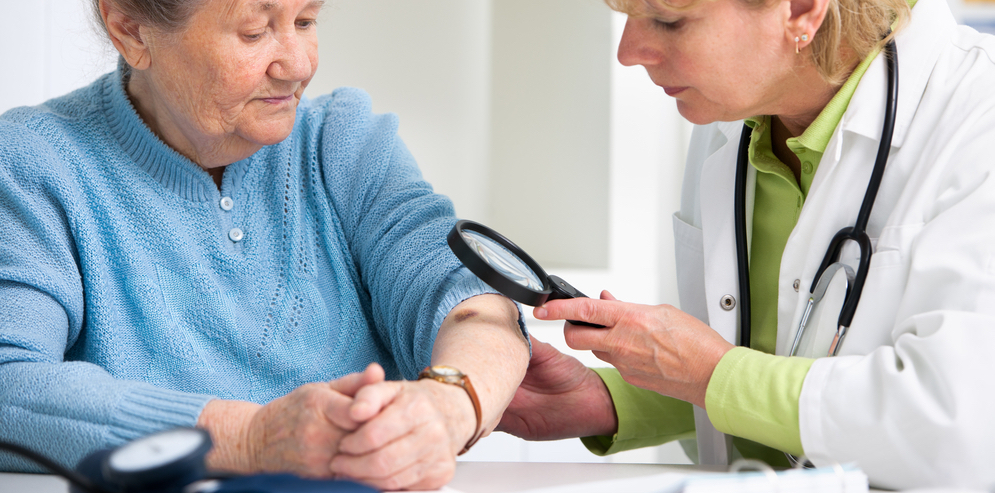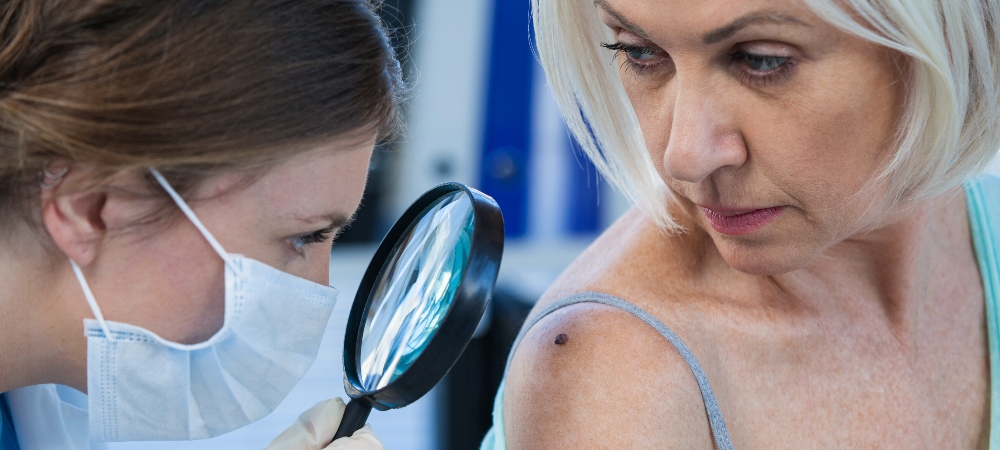
Eczema can sometimes be confused with skin cancer, because of the symptoms associated with the condition. Scaly patches, blisters, and other symptoms can alarm people with eczema, especially if these symptoms appear later in life. Only a dermatologist can be sure if you’re dealing with skin cancer or eczema. Keeping up with routine skin cancer screenings won’t treat eczema, but it can give you peace of mind going forward. Below you can find out if skin cancer can look like eczema and more.
What is Eczema?
Eczema is an inflammatory skin condition that causes itchy skin, dry skin, scaly patches, blisters, rashes, and skin infections. According to the National Eczema Association, eczema affects over 30 million Americans and can appear in childhood, adolescence, or adulthood. There are seven different types of eczema: atopic dermatitis, contact dermatitis, dyshidrotic eczema, nummular eczema, seborrheic dermatitis, and stasis dermatitis.
Eczema ranges from mild to severe. A “flare-up” of eczema is a phase of the condition where the symptoms are especially noticeable and uncomfortable. Flare-ups can last anywhere from a few days to several weeks. There’s no cure for eczema, but there are ways to treat the symptoms, such as using moisturizing creams, prescription topical corticosteroids, over-the-counter remedies, and more.
Can Eczema Cause Skin Cancer?
According to the National Eczema Association, having eczema doesn’t necessarily increase your risk of skin cancer. However, some eczema symptoms can resemble those of different types of skin cancer. This often leads to questions like, “Can skin cancer look like eczema?” and more. For people with eczema, especially severe eczema, it can be harder to detect the early warning signs of skin cancer, because they already experience symptoms like scaly patches, blisters, dry patches, etc. If you have eczema, it’s important to get regular skin cancer screenings and consult your dermatologist if you notice anything unusual.
What to Look for: The ABCDEs of Skin Cancer
In addition to getting regular full-body screenings, you can use the ABCDEs of skin cancer to complete a self-examination. This will help you monitor any changes in your skin in between regular appointments with your dermatologist. The ABCDEs stand for visual signs that are typically associated with skin cancer, including asymmetry, border, color, diameter, and evolving. If you notice anything out of the ordinary, have it examined as soon as possible to determine whether it’s skin cancer or eczema.
Skin Cancer vs. Eczema
Skin cancer can present in various forms and may share some similarities with the description of eczema. Here are some of the similarities and differences between skin cancer and eczema:
Similarities:
- Itchy Skin: Both eczema and some types of skin cancer can cause itching.
- Skin Changes: Both conditions can result in visible changes to the skin, including dryness, scaliness, and patches.
- Rashes: Eczema often manifests as red, inflamed rashes, while certain types of skin cancer, such as basal cell skin cancer or squamous cell skin cancer, may present as raised, red, or scaly patches.
- Skin Infections: Eczema-prone skin may be more susceptible to infections, and untreated skin cancer lesions can become infected.
Differences:
- Blistering: While eczema can cause blisters, they are more commonly associated with certain types of eczema like dyshidrotic eczema. Skin cancer typically does not cause blisters unless it has progressed significantly.
- Specific Lesions: Skin cancer lesions often have distinct features such as irregular borders, asymmetry, and color changes, which may not be typical of eczema which makes it one of the most noticeable differences between skin cancer and eczema.
- Persistence: Eczema flare-ups may come and go, while skin cancer lesions typically persist and may slowly grow over time if left untreated.
- Response to Treatment: Eczema can often be managed with topical treatments and lifestyle modifications. In contrast, treatment for skin cancer usually involves surgical removal, radiation therapy, or other specialized interventions.
When to See a Dermatologist
When faced with concerning skin symptoms like eczema or the possibility of skin cancer, seeking guidance from a dermatologist is crucial. Dermatologists are trained to diagnose and treat a wide range of skin conditions, providing expert care tailored to your specific needs. To make the most of your dermatologist appointment and ensure an accurate diagnosis, proper preparation is essential. Here’s what you can do to prepare:
- Note symptoms, duration, severity, and exacerbating/alleviating factors.
- Take clear photos of skin symptoms, including close-ups of concerning areas.
- Prepare a list of questions about symptoms, causes, treatments, and prevention.
- Wear loose clothing for easy skin examination; avoid makeup or nail polish.
- Bring relevant medical documents like past screenings or biopsies.
- Be honest with your dermatologist about symptoms, concerns, and lifestyle habits for accurate diagnosis and treatment planning.
By taking these proactive steps to prepare for your dermatologist appointment, you can help ensure a productive and informative consultation. Remember, early detection and timely intervention are key to managing skin conditions like eczema and skin cancer effectively, so don’t hesitate to seek professional medical care if you have any concerns about your skin health.
Learn More About GentleCure / Image-Guided SRT
If you’ve recently been diagnosed with basal cell or squamous cell skin cancer, talk to your healthcare provider to learn more about GentleCure™ / Image-Guided SRT — a surgery-free form of treatment for common skin cancers. Contact us online or by phone to speak with one of our skin cancer information specialists today.








